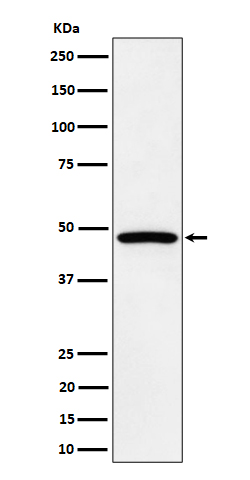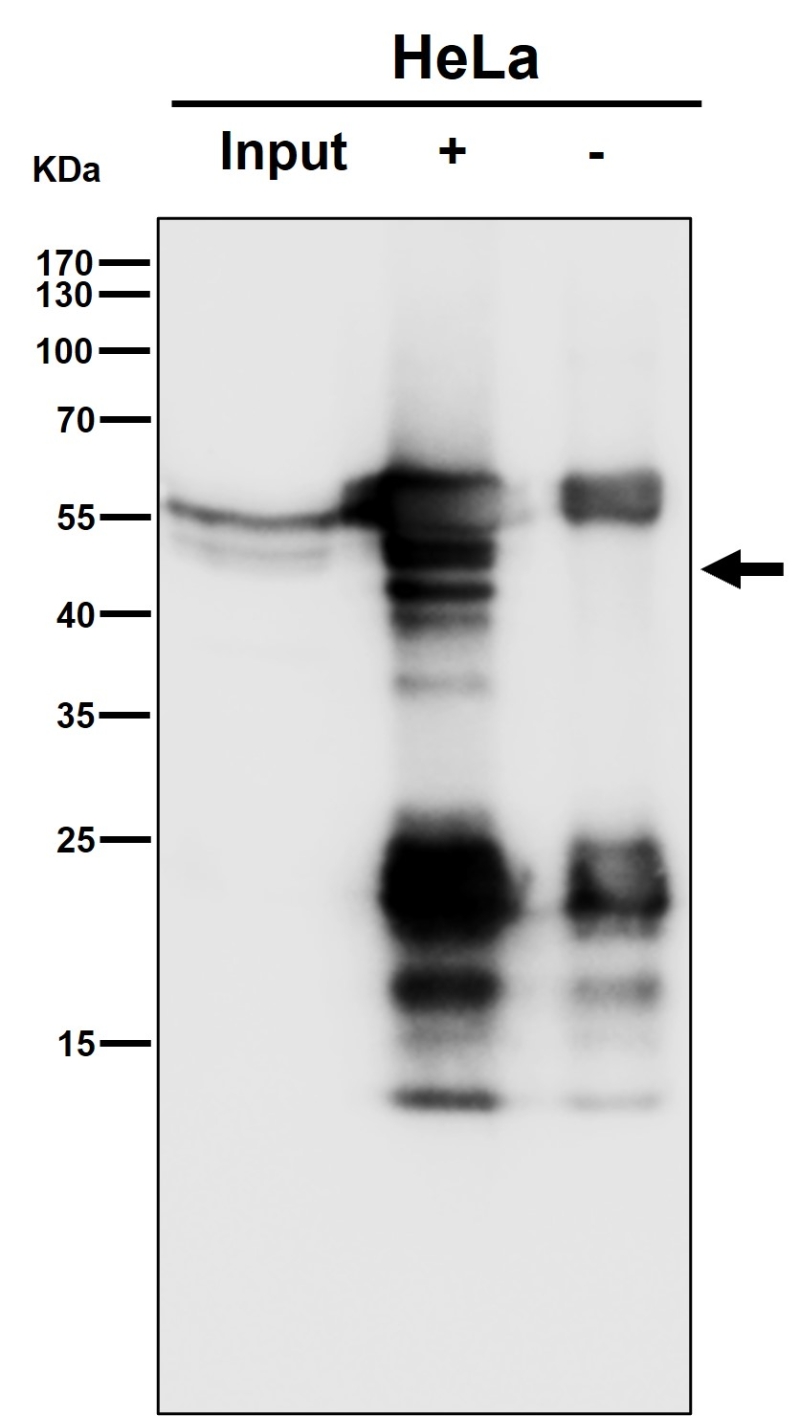

| WB | 咨询技术 | Human,Mouse,Rat |
| IF | 1/20-1/50 | Human,Mouse,Rat |
| IHC | 咨询技术 | Human,Mouse,Rat |
| ICC | 技术咨询 | Human,Mouse,Rat |
| FCM | 1/20-1/100 | Human,Mouse,Rat |
| Elisa | 咨询技术 | Human,Mouse,Rat |
| Aliases | Protein tyrosine phosphatase non receptor type 2; PTN2; Ptpn2; PTPT; T cell protein tyrosine phosphatase; TC PTP; TCELLPTP; TCPTP; Tyrosine protein phosphatase non receptor type 2;;PTPN1/2 |
| WB Predicted band size | Calculated MW: 50,48 kDa ; Observed MW: 40-48 kDa |
| Host/Isotype | Rabbit IgG |
| Antibody Type | Primary antibody |
| Storage | Store at 4°C short term. Aliquot and store at -20°C long term. Avoid freeze/thaw cycles. |
| Species Reactivity | Human,Mouse |
| Immunogen | A synthesized peptide derived from human PTPN1 |
| Formulation | Purified antibody in PBS with 0.05% sodium azide,0.05% BSA and 50% glycerol. |
+ +
以下是关于PTPN1和PTPN2抗体的3篇参考文献,按文献名称、作者和摘要内容概括列出:
---
1. **文献名称**:*Protein tyrosine phosphatase 1B inhibitors for diabetes*
**作者**:Johnson TO et al.
**摘要内容**:该研究综述了PTPN1(PTP1B)在胰岛素信号通路和肥胖中的调控作用,并探讨了其作为2型糖尿病治疗靶点的潜力。文中提到通过特异性抗体抑制PTP1B活性,可增强胰岛素敏感性,并在小鼠模型中验证了其代谢改善效果。
---
2. **文献名称**:*T-cell protein tyrosine phosphatase regulates immune responses in colitis*
**作者**:Spalinger MR et al.
**摘要内容**:本研究利用PTPN2(TC-PTP)抗体分析其在肠道炎症中的作用,发现PTPN2缺失导致STAT3信号异常激活,加剧小鼠结肠炎。抗体检测证实肠道上皮细胞中PTPN2表达下调与炎症性肠病相关。
---
3. **文献名称**:*Dual role of PTP1B in cancer progression and immunotherapy resistance*
**作者**:Wang J et al.
**摘要内容**:通过免疫组化及Western blot使用PTPN1抗体,研究发现PTP1B在肿瘤微环境中高表达,既能促进癌细胞的侵袭性,又通过调控T细胞功能介导免疫治疗耐药,提示其作为联合治疗靶点的潜力。
---
**备注**:以上文献为示例,实际引用时需根据具体研究领域和数据库(如PubMed、Web of Science)检索最新或高引论文,并确保摘要中明确提及抗体应用。
PTPN1 (Protein Tyrosine Phosphatase Non-Receptor Type 1) and PTPN2 (Protein Tyrosine Phosphatase Non-Receptor Type 2) are intracellular tyrosine phosphatases that play critical roles in regulating cellular signaling pathways. Both belong to the class I family of protein tyrosine phosphatases (PTPs) and share structural homology, including a conserved catalytic domain. PTPN1. also known as PTP1B, is widely expressed and negatively regulates insulin and leptin signaling, making it a therapeutic target for diabetes and obesity. PTPN2. or TCPTP, is highly expressed in hematopoietic cells and modulates immune responses, growth factor signaling, and inflammation. Dysregulation of these phosphatases is linked to cancer, metabolic disorders, and autoimmune diseases.
Antibodies targeting PTPN1/2 are essential tools for studying their expression, localization, and function in physiological and pathological contexts. These antibodies are commonly used in techniques like Western blotting, immunohistochemistry, and immunofluorescence to detect protein levels in tissues or cell lines. Due to the structural similarity between PTPN1 and PTPN2. antibody specificity is crucial; rigorous validation using knockout controls or siRNA knockdown is required to avoid cross-reactivity. Research applications include investigating their roles in insulin resistance, tumor suppression, or immune checkpoint regulation. Additionally, PTPN1/2 inhibitors are under development for therapeutic use, driving demand for reliable antibodies to assess target engagement and pharmacodynamic effects in preclinical studies.
×